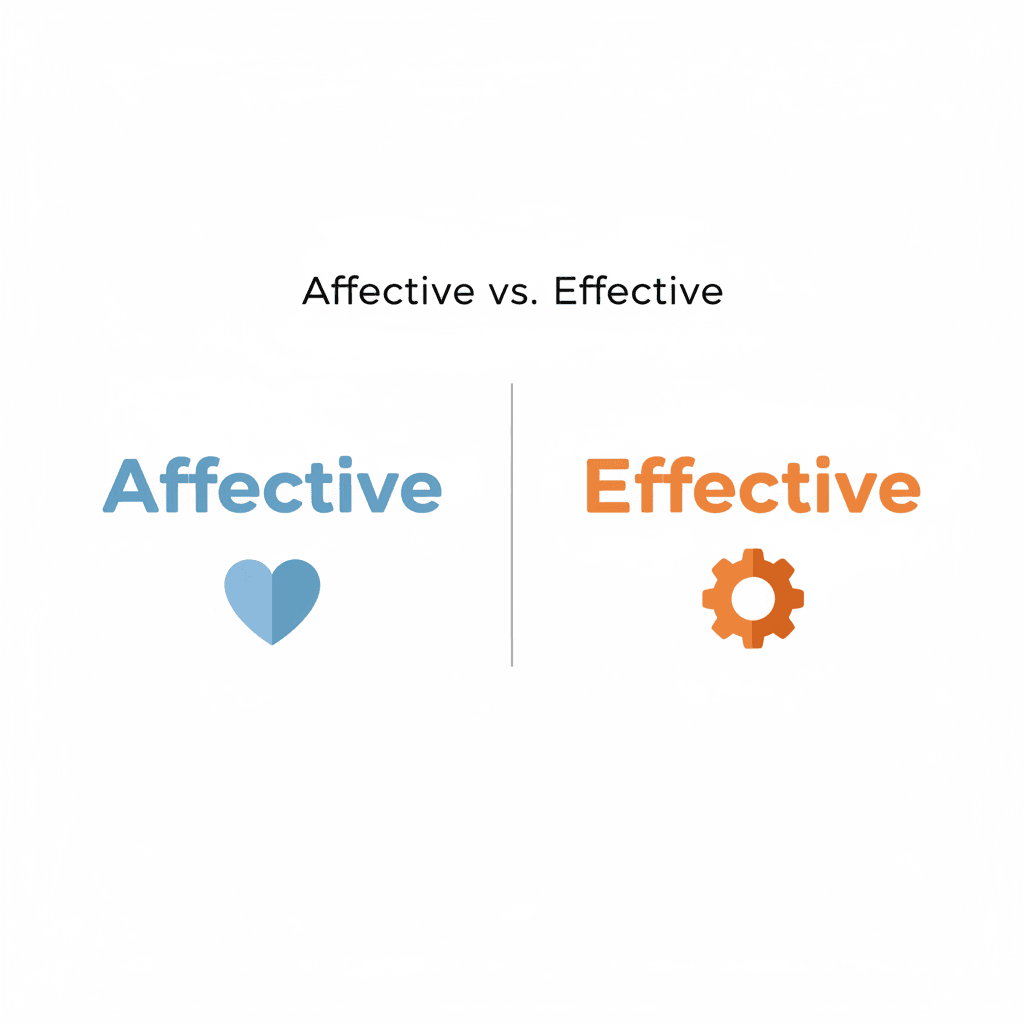Affective vs. Effective: What’s the Difference?
 Although affective and effective share similar endings, they belong to different word families and meanings.
Although affective and effective share similar endings, they belong to different word families and meanings.
Here’s the quick difference:
- Affective → related to emotions or feelings.
- Effective → producing a desired result or effect.
Let’s explore each one in detail.
Affective: About Emotions and Feelings
Meaning
“Affective” is an adjective used mostly in psychology, education, and emotional studies.
It describes something related to moods, feelings, or emotional responses.
Examples (10 total)
- The teacher focused on students’ affective development.
- Her affective response showed deep empathy.
- Music has a strong affective influence on people.
- The movie created an affective connection with the audience.
- Therapists often study affective behavior patterns.
- His affective expression revealed sadness.
- Emotional intelligence involves the affective domain.
- The affective tone of the poem was melancholic.
- A good speech appeals to both logic and affective emotions.
- Psychologists measure affective reactions to different situations.
🧠 Tip:
If it’s about feelings, mood, or emotion, use affective.
Effective: About Results and Success
Meaning
“Effective” means producing the intended result or working well.
It’s used to describe something that achieves its goal successfully.
Examples (10 total)
- The new policy was very effective.
- This medicine is effective for treating headaches.
- A smile is an effective way to make friends.
- The ad campaign was highly effective.
- He is an effective communicator.
- Time management is essential for effective learning.
- The new system is more effective than the old one.
- That’s not an effective solution to the problem.
- Training made the team more effective at their jobs.
- The teacher used effective methods to help students understand.
🧠 Tip:
If it’s about results, success, or working properly, it’s effective.
Quick Comparison Table
| Word | Meaning | Part of Speech | Example | Field |
|---|---|---|---|---|
| Affective | Related to emotions or feelings | Adjective | Her affective response showed empathy. | Psychology / Education |
| Effective | Producing results or success | Adjective | The new plan was very effective. | General use |
How to Remember the Difference
👉 Affective → think of “affection” → feelings.
👉 Effective → think of “effect” → results.
💡 Memory Trick:
“Affective” = A for Emotion
“Effective” = E for Efficiency
Common Mistakes
❌ Her speech was very affective.
✅ Her speech was very effective. (It achieved its purpose.)
❌ The therapy had a positive effective response.
✅ The therapy had a positive affective response. (Emotional impact)
Why It’s Easy to Confuse Them
They both come from the Latin root facere, meaning “to do or make.”
But over time, affective took on an emotional meaning, while effective stayed result-focused.
Even AI writing tools sometimes mix them up — which is why Humanizey helps ensure contextually correct word choices for natural, human-like writing.
FAQs
1. Is “affective” a common word?
Not really. It’s mostly used in psychology, education, and emotional research.
2. Can “effective” describe a person?
Yes — if the person gets results.
Example: She’s an effective leader.
3. What is the opposite of “effective”?
Ineffective — meaning “not working well” or “not producing results.”
4. Can “affective” ever mean “effective”?
No. They are unrelated in modern English.
Practice: Choose the Correct Word (“Affective” or “Effective”)
(Answers are listed at the end.)
- The medicine was very ___ in reducing pain.
- The movie created a strong ___ reaction among viewers.
- This new plan is more ___ than the old one.
- Teachers care about students’ ___ growth, not just grades.
- Her speech was so ___ that it made people cry.
- That’s not an ___ solution to the problem.
- The therapy aims to improve ___ behavior.
- An ___ strategy can save both time and money.
- His art shows deep ___ sensitivity.
- It’s an ___ way to manage stress.
Answers
- effective
- affective
- effective
- affective
- affective
- effective
- affective
- effective
- affective
- effective
